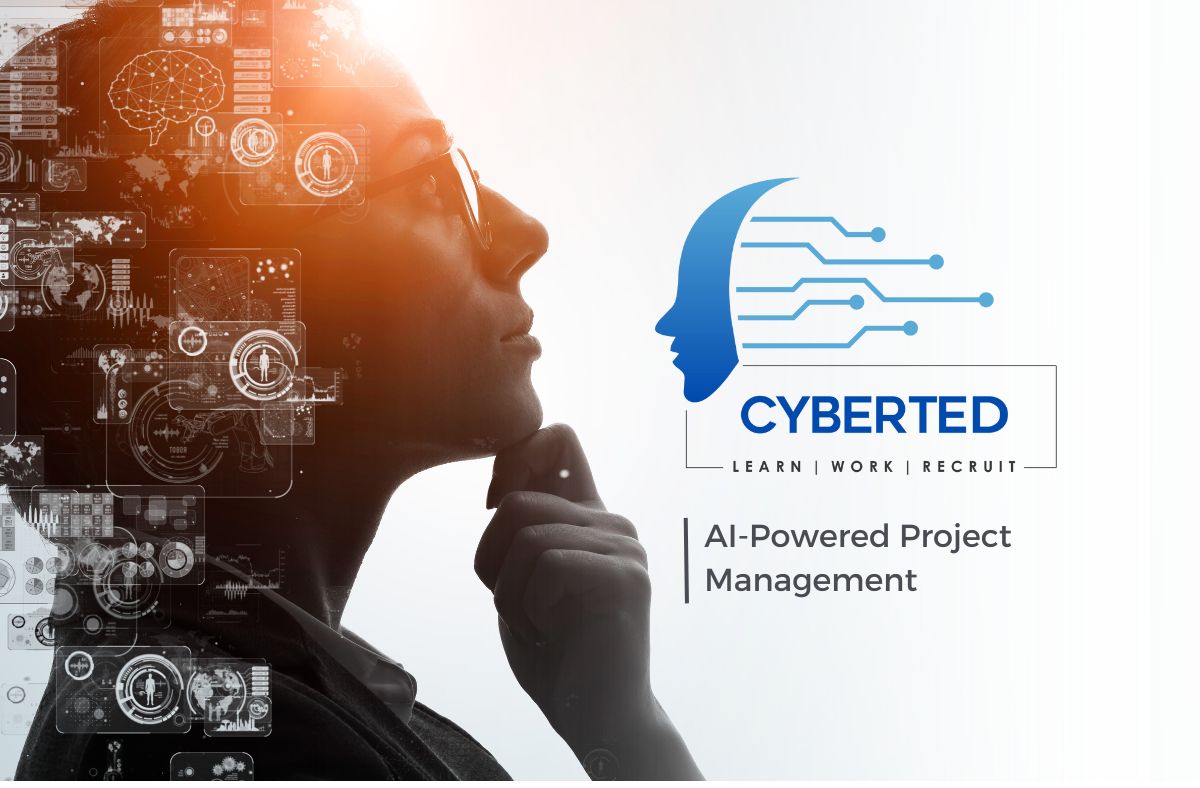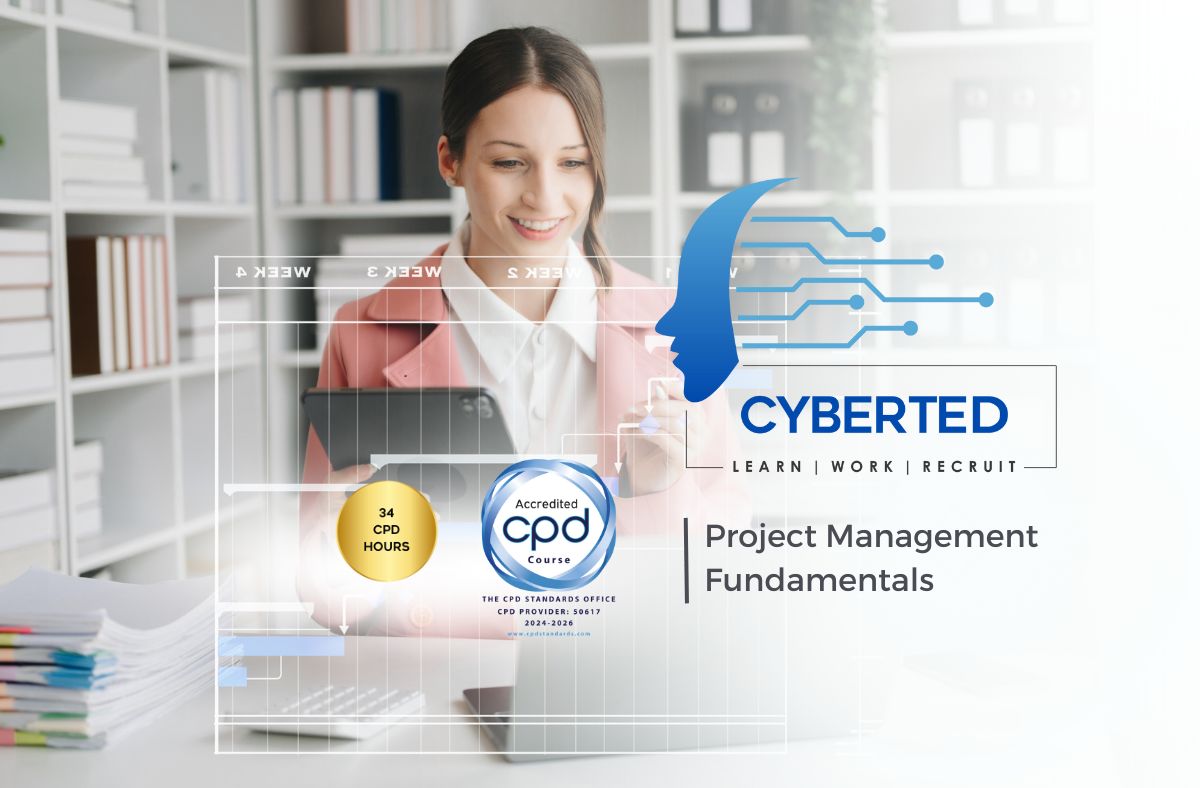CyberTED is where ambition meets opportunity. We deliver industry-relevant training, connect skilled talent with recruiters, and empower creators to launch their own courses. Through accessible skills training, career-building courses, and strategic employer connections, we empower individuals to take control of their future.
COURSES
AI-Powered Project Management
Understand the basics of AI and its applications in project management
Project Management Fundamentals
The Project Management Fundamentals course aims to equip learners with the core principles, methodologies, and best practices needed to effectively initiate, plan, execute, control, and close projects. By the end of the course, participants will have a solid foundation in project management, enabling them to successfully manage projects across various industries.
Management Essentials
This course aims to provide a comprehensive understanding of the fundamental principles, theories, and practices of management. Students will explore various management functions, including planning, organizing, leading, and controlling, as well as essential skills such as decision-making, communication, and team building. Through case studies, discussions, and practical exercises, students will develop the knowledge and skills necessary to effectively manage individuals, teams, and organizations.
Course Objectives:
To introduce students to the basic concepts and theories of management.
To familiarize students with the key functions of management: planning, organizing leading, and controlling.
User Experience Design
Welcome to the exciting journey of UX Design!
In this course, you'll dive into the world of User Experiences, learning how to create intuitive, effective, and delightful digital products. Whether you are a seasoned designer or a complete beginner, this course will equip you with the skills and knowledge to design user-centric solutions that stand out.
We'll cover usability principles, user research methods, wireframing, prototyping, and much more. You'll be introduced to UX design tools and techniques, and by the end of the course, you'll be ready to tackle real-world design challenges.
Get ready to explore, create, and transform your ideas into impactful user experiences. Let's embark on this creative adventure together!
Happy designing!
ESSENTIAL SKILLS FOR YOUNG ADULTS
"Navigating the Transition: Essential Skills for Young Adults" is an online course designed to support young individuals, typically in their late teenage years to early twenties, as they move from adolescence to adulthood. The course emphasizes the importance of making informed decisions during this critical transition, covering foundational skills necessary for personal and professional growth, including financial literacy, networking, and entrepreneurship. It also highlights the diverse roles young adults can embody, such as students and interns, and encourages social contributions through community service and civic engagement. Ultimately, participants will gain the knowledge and tools needed to navigate this pivotal stage of life confidently and purposefully.
Hybrid Project Management
The Hybrid Project Management Course equips participants with skills for thriving in dynamic project environments. It focuses on mastering hybrid management principles to lead teams effectively and achieve success in changing landscapes. By combining Waterfall’s structure with Agile’s adaptability, it offers a flexible framework for diverse project needs. This integration improves outcomes, stakeholder satisfaction, and responsiveness to evolving requirements.
Being An Exceptional Business Analyst
This course is aimed at the newly appointed Business Analyst that want to understand what needs to be done to perform their role to its fullest potential. When someone is appointed, the basics of what needs to be done is never taught and their first responsibility will probably be to resolve some business problem that entails a business process that needs to be corrected to align with system functionality. This course will assist the new Business Analyst:
To understand their position in an organisation.
How to operate with in a Systems Development Life Cycle and a Project Development Life Cycle.
UNDERSTANDING THE AI REVOLUTION AND A WORLD OF ENDLESS POSSIBILITIES
"Navigating the Transition : Understanding the AI Evolution and a World of Endless Possibilities” is an online course designed to guide you through the fascinating world of Artificial Intelligence (AI), the revolutionary force behind today's technological advancements.
From the foundational concepts of AI to the intricate workings of Machine Learning (ML) and the human-like reasoning of Cognitive Computing, you'll embark on a journey exploring the depths of these sub-categories that are reshaping every aspect of our lives.
Agile Project Management
Agile project management is a method of software development that focuses on quick rollouts from an efficient and flexible team. Iterations are based on a continuous inflow of feedback, but instead of trying to solve everything in a few updates, a team has shorter phases in the development cycle to cover only a few updates at a time in order to constantly release a steady, elevated level of quality incremental improvements.
Agile was originally developed for the software industry to streamline and improve the development process in an effort to rapidly identify and adjust for issues and defects. It provides a way for developers and teams to deliver a better product, in a faster manner, through short, iterative, interactive sessions/sprints. In the era of digital transformation, with many companies migrating to a digital workplace, agile is a perfect fit for organizations looking to transform how they manage projects and operate as a whole. Agile can help ensure company-wide process and methodological alignment. In terms of business benefits, both the digital workplace and agile provide
Increased flexibility
IT Project Management
The course consists of several well-structured modules related to IT project management as well as specific software skills based on the practical construction and implementation of projects. The course focuses on project management fundamentals, mechanisms and supportive technologies, and includes functional guidance in the work environment.
COURSES COMING SOON
IT Security
- Identify and explain common cybersecurity threats and countermeasures
- Apply basic IT security practices in personal and professional contexts
- Understand the roles, tools, and policies involved in securing IT systems
- Explore career options and next steps in the cybersecurity field
Quality Assurance Management: Principles, Practices and Performance
- Quality Assurance Managers and Officers
- Project Managers and Team Leads
- Operations Managers
- Process Improvement Specialists
- Professionals seeking to enhance their understanding of QA processes
- Understand the principles and objectives of Quality Assurance (QA) and Quality Management.
- Develop and implement QA policies, procedures, and standards.
- Conduct quality audits and assessments effectively.
- Apply tools and techniques for process improvement (e.g., Six Sigma, Lean, PDCA).
- Analyse quality data to identify trends, issues, and opportunities for improvement.
- Manage compliance with industry standards and regulatory requirements.
- Foster a culture of continuous improvement within teams and organizations.
IT & Systems Quality Assurance Management
- IT Project Managers
- QA/Test Managers and Analysts
- Systems and Application Developers
- IT Operations and Support Teams
- Professionals responsible for system performance, reliability, and compliance
- Understand IT quality assurance principles and frameworks.
- Plan, design, and execute testing strategies for software and systems.
- Implement QA processes across the software development lifecycle (SDLC).
- Use automated and manual testing tools effectively.
- Monitor system performance and reliability.
- Identify, track, and manage defects and issues.
- Ensure compliance with IT governance and security standards.
- Drive continuous improvement in IT quality and operational processes.
Lean Project Management: Maximizing Efficiency and Value Delivery
- Project Managers and Project Coordinators
- Operations Managers
- Process Improvement Specialists
- Team Leaders and Scrum Masters
- Professionals seeking to implement Lean principles in projects
- Understand the principles and philosophy of Lean Project Management.
- Identify and eliminate waste in project processes.
- Use Lean tools such as Value Stream Mapping, Kanban, and 5S.
- Apply Lean techniques to improve project planning, execution, and delivery.
- Optimize resource utilization and reduce project lead times.
- Enhance stakeholder engagement and satisfaction through value-focused delivery.
- Integrate Lean principles with Agile and other project management methodologies.
- Monitor, measure, and continuously improve project performance.



















